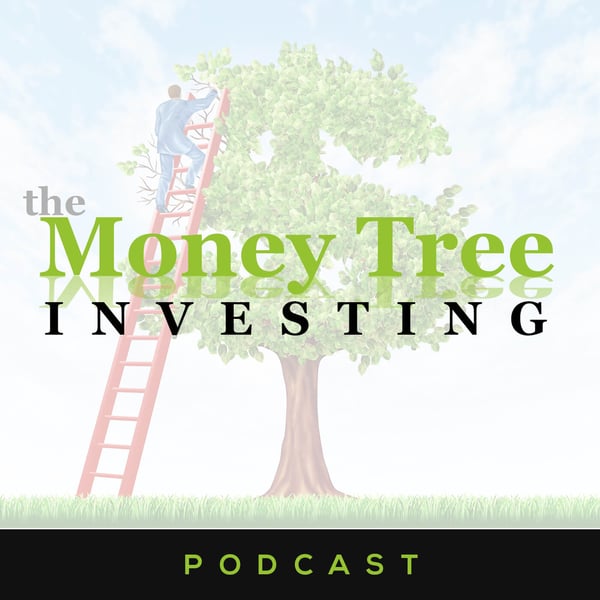Disrupting Taxes with Thomas J. Cryan
Money Tree Investing
Money Tree Investing Podcast
4.6 • 658 Ratings
🗓️ 28 February 2025
⏱️ 65 minutes
🧾️ Download transcript
Summary
Thomas J. Cryan joins us to discuss his new book Disrupting Taxes. He highlights how tariffs historically served as the primary source of U.S. federal revenue until the Civil War, after which income taxes took over. He criticizes the current tax system for its heavy reliance on individual salaries and argued for a more efficient, technology-driven approach. We also touch on the national debt, the need for a balanced budget, and concerns about government spending. Thomas advocates for a system that automatically adjusts tax rates to match expenditures.
We discuss...
- Thomas J. Cryan shares his background as a writer, attorney, and entrepreneur with a focus on law and economics.
- Cryan discusses his book Disrupting Taxes, inspired by the upcoming expiration of the Tax Cuts and Jobs Act in 2025.
- The conversation shifts to the historical role of tariffs, particularly how they funded the U.S. government for its first 70 years.
- The current tax system disproportionately burdens individuals, with 90% of federal revenue coming from salaries and income.
- Cryan critiques the self-declaratory nature of income tax, arguing it leads to inefficiencies and inequities.
- He proposes a 1% automated banking transaction tax to replace income tax and eliminate the IRS.
- This system would tax all banking transactions equally, spreading the burden more fairly across the economy.
- A proposed tax system would implement a flat 2% transaction tax, significantly lower than current income tax rates.
- Government transactions would also be taxed, eliminating loopholes and ensuring transparency in spending versus tax collection.
- While the system removes the IRS in its current form, some technological oversight would still be needed for enforcement.
- Low tax rates could discourage avoidance, as the effort to evade 1% taxation may not be worth the hassle.
- The U.S. tax system must consider global competition to remain economically viable.
- Tariffs can be an economic tool but may create global trade imbalances and diplomatic tensions.
- A technology-driven transaction tax system could increase efficiency and fairness over time.
- Free market principles suggest that supply and demand will eventually create equilibrium despite policy shifts.
- State and local governments operate under different tax systems, creating challenges in integrating federal tax changes.
- Broadening the tax base at all levels could lead to lower rates and a fairer system overall.
- States with high income taxes may consider adopting transaction-based taxation models.
For more information, visit the show notes at https://moneytreepodcast.com/disrupting-taxes-thomas-j-cryan-690
Today's Panelists:
- Kirk Chisholm | Innovative Wealth
- Barbara Friedberg | Barbara Friedberg Personal Finance
- Jeff Hulett | Finance Revamp
Follow on Facebook: https://www.facebook.com/moneytreepodcast
Follow LinkedIn: https://www.linkedin.com/showcase/money-tree-investing-podcast
Follow on Twitter/X: https://x.com/MTIPodcast
Transcript
Click on a timestamp to play from that location
| 0:00.0 | Welcome to the Money Tree Investing Podcast. |
| 0:04.0 | Stock market, wealth, personal finance, value stocks, invest in your life. |
| 0:10.0 | Hello, Smart Money Tree Podcasts listeners. Welcome to this week's show. My name is Kirk Chisholm and I'll be your host. |
| 0:15.0 | So today I'm joined with Thomas Crian. How you doing, Thomas? |
| 0:19.0 | Very good, Kirk. How are you, sir? |
| 0:20.0 | Doing well. Glad to even the show here. For those of the listeners who don't How you doing, Thomas? Very good, Kirk. How are you, sir? Doing well. Glad |
| 0:21.3 | to be in the show here. For those listeners who don't know you are, maybe you could tell us a bit about |
| 0:25.6 | yourself and your background. I'm a writer, an attorney, an entrepreneur. What happened, Kirk, is that |
| 0:30.9 | back in my law school days at the University of Miami, I ended up being appointed a staff writer |
| 0:36.7 | in the Law and Economics Center. |
| 0:38.9 | And I was assigned to an economist by the name of Dr. Roger Leroy Miller. |
| 0:43.8 | And Miller really opened my eyes to many of the hidden sides, many of the hidden effects of |
| 0:49.5 | laws on our society, on the culture in general. And you could think of Miller as an early iteration of |
| 0:58.5 | Freakonomics. And based on that, I became fascinated in the subject matter. Based on that, |
| 1:04.4 | I spent a lot of time not only writing his books and academic articles, but then I started |
| 1:10.4 | writing my own articles. And as I started |
| 1:13.4 | the profession, I was a visiting professor in a small Catholic university for a year, practice |
| 1:18.6 | law for a year. And then I went out entrepreneurally, I started my own little media firm in the |
| 1:25.5 | small market radio business. And so that's how I started. But during |
| 1:29.4 | all of those periods, I wrote and continued to advance a lot of these ideas around law and |
| 1:35.6 | economics focused on the tax system. And what happened, Kurt, is during the pandemic, all those ideas |
| 1:42.5 | came together. And I wrote this book, Disrupting Taxes, |
... |
Please login to see the full transcript.
Disclaimer: The podcast and artwork embedded on this page are from Money Tree Investing Podcast, and are the property of its owner and not affiliated with or endorsed by Tapesearch.
Generated transcripts are the property of Money Tree Investing Podcast and are distributed freely under the Fair Use doctrine. Transcripts generated by Tapesearch are not guaranteed to be accurate.
Copyright © Tapesearch 2025.

